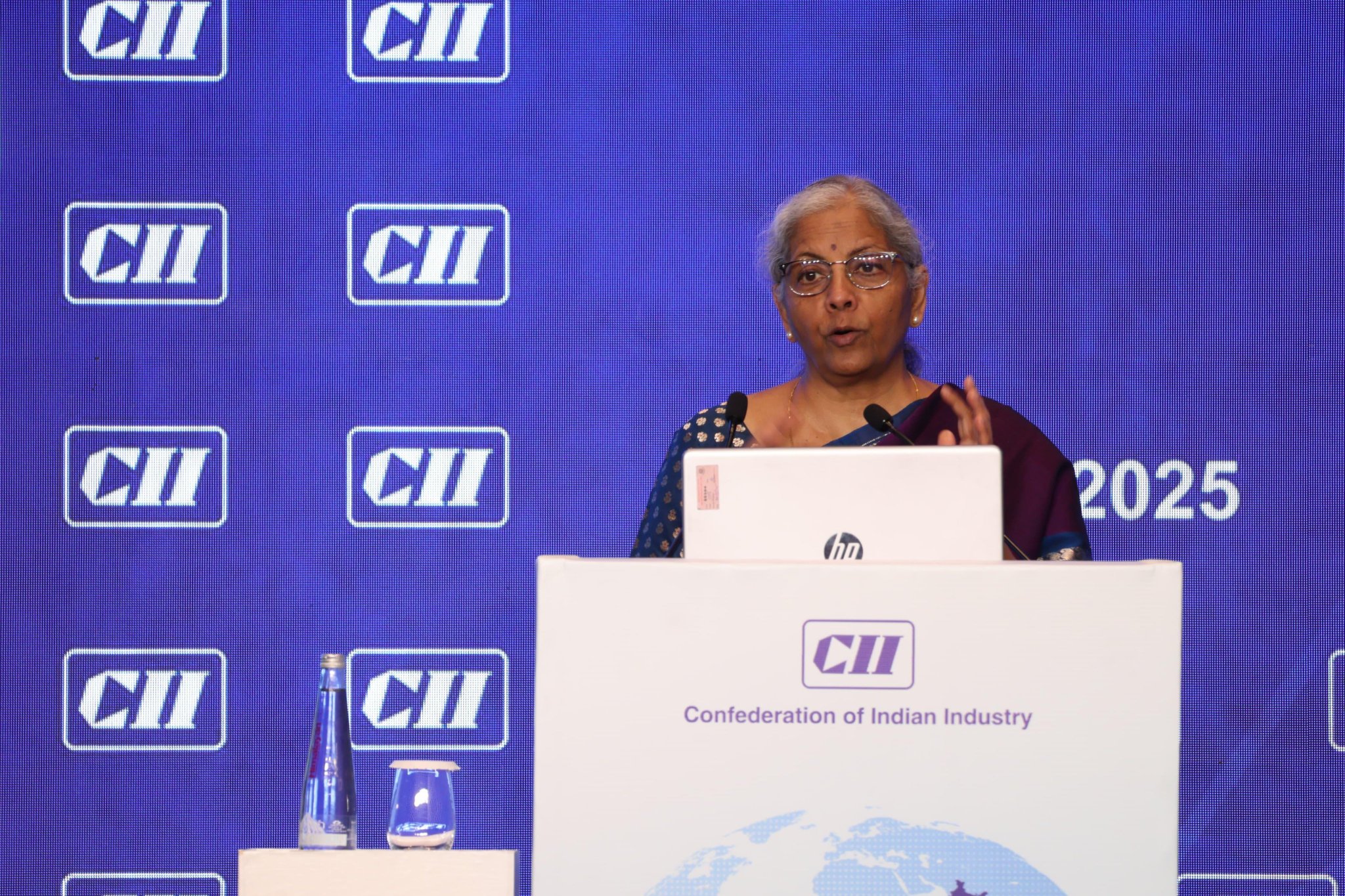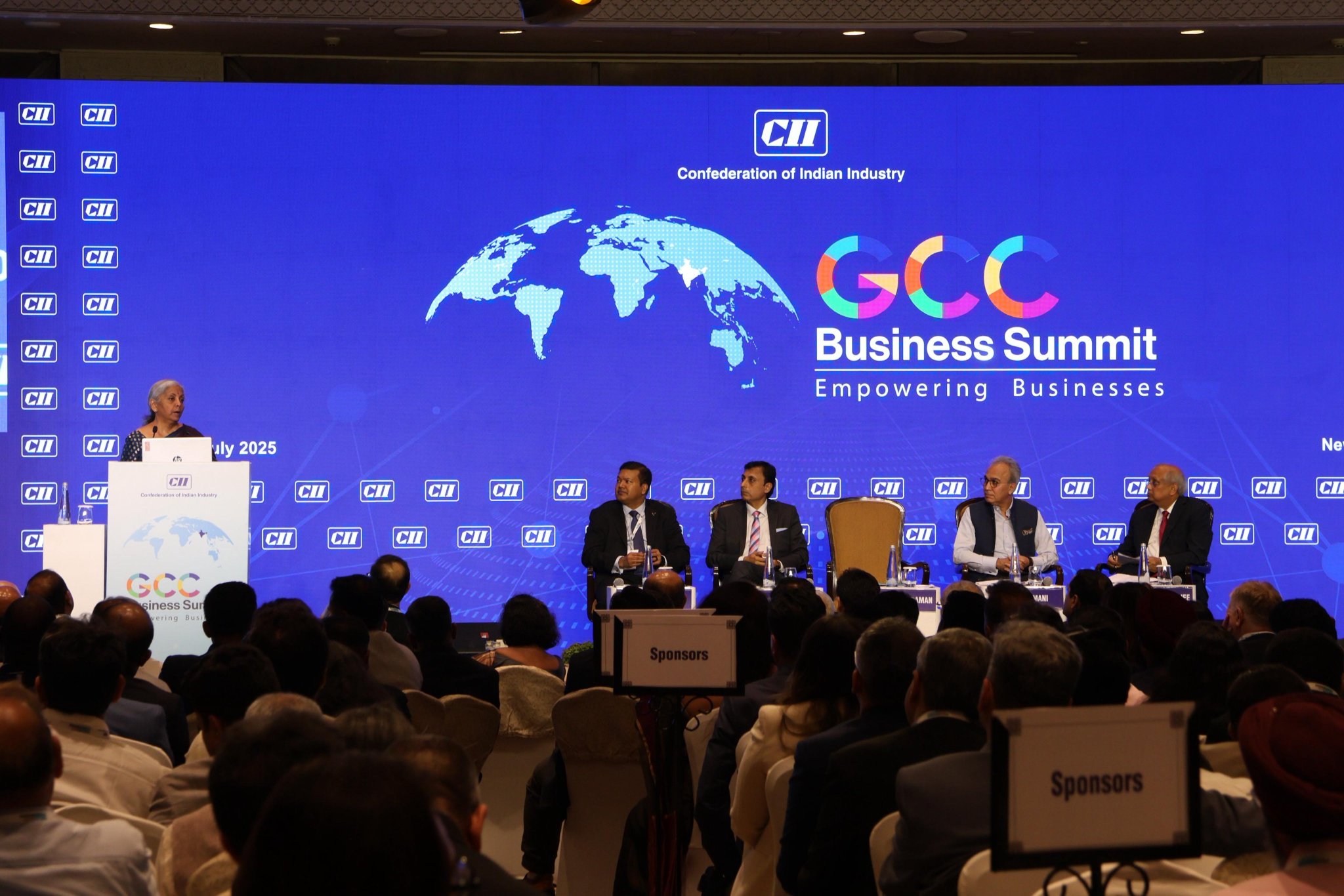
‘India must move faster on GCC Growth’ – FM Sitharaman urges States and Industry at CII Global Capability Centers Summit
GANDHINAGAR : Hon’ble Union Finance Minister Smt.Nirmala Sitharaman at the CII Global Capability Centers Summit on Monday urged industry to explore opportunities in tier 2 and 3 cities and highlighted GIFT City’s immense potential—citing its unified regulatory setup, industry-ready talent, and conducive tax regime. She called for urgent, coordinated action across the Union and state governments to accelerate the growth of Global Capability Centres (GCCs) in India, warning that the country risks losing its competitive advantage if it fails to scale up rapidly.
Speaking at the CII Global Capability Centre (GCC) Summit in Delhi, Sitharaman highlighted the sector’s rapid growth—adding 1,000 new GCCs between 2015 and 2024—but said India cannot afford to be complacent.

“We need to literally lubricate the entire administrative and governing mechanism, top down, to make sure the same energy prevails everywhere,” she told industry leaders.
She urged states and local administrations to work closely with the center, describing a need for “institutionalized governance mechanisms” that can push policy benefits all the way to the district level.
Growing footprint, but challenges ahead
Sitharaman shared new data showing India’s GCC sector employs around 2.16 million professionals, with a compound annual growth rate (CAGR) of 11% over the past five years.
“This number is expected to go to 2.80 million by 2030—and I guess this is a very conservative number,” she said.
She added that GCCs currently contribute about $68 billion in direct gross value addition to the Indian economy—roughly 1.6% of GDP—and could potentially reach between $150 billion and $200 billion by 2030.
But despite this promise, Sitharaman said India must remain vigilant about attracting new investors, noting that “approximately 50% of all Fortune 500 companies have set up their GCCs in India” while “two-thirds are not here.”
Engineering, R&D Lead the Charge
The minister highlighted a strong trend toward high-value work in India, with engineering research and development GCCs growing 1.3 times faster than the sector average over the last five years.
“There is a clear shift towards high-value-added work in India, and that’s something you can’t ignore,” she said.
She also cited surveys showing over 35% of transformation hubs in India report a strong presence of architects, indicating the sector’s growing complexity and global leadership roles.
India’s Talent Advantage
Sitharaman strongly underscored India’s cost competitiveness, noting talent costs are 30–50% lower than in the US, UK, or Australia.
She also emphasized India’s STEM talent pool, saying 32% of global GCC talent is based in India.
“The highest proportion of female STEM graduates at 42.7% is something I’m very happy about,” she said, applauding the GCC industry for 35% female participation in its workforce.
AI Focus and Skilling Push
In a notable section of her address, Sitharaman touted India’s growing AI capability.
“According to the Stanford AI Index 2024, since 2016, India has had the highest penetration of AI skills,” she said.
She pointed to government efforts such as new IITs and IIITs, centers of excellence for AI, and the PM Kaushal Vikas Yojana, which has trained 1.6 crore people.
“We’re not just talking about tier-1 cities. AI labs and training are going to tier-2 and tier-3 cities,” she said.
Gift City as a Model
Sitharaman also praised Gujarat’s GIFT City as a successful model for attracting GCC investment.
“GIFT City has played a lot in bringing STEM education, particularly for the financial sector… The taxation and other things are all very conducive,” she said, noting the ease of regulation under a single-window framework.
Industry Urged to Act
Closing her remarks, Sitharaman called on industry leaders to partner with the government to ensure India maintains its edge.
“India should not lose this advantage that it has. Whether it is taxation, legislative support, or state administration—we shall ensure that all of us are going to be in this together,” she promised.
The summit, hosted by the Confederation of Indian Industry, is part of a series of engagements aimed at shaping India’s GCC strategy and policies.

